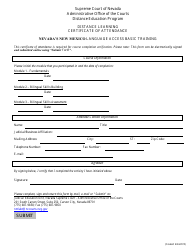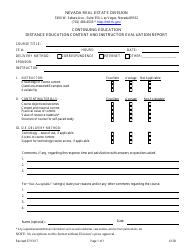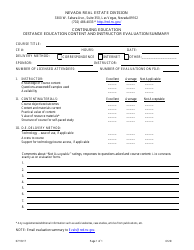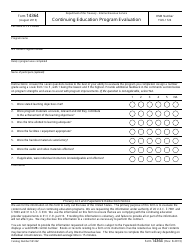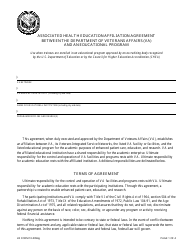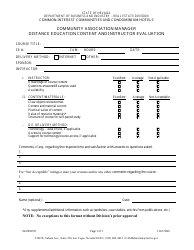Distance Learning Evaluation - Distance Education Program - Nevada
Distance Learning Evaluation - Distance Education Program is a legal document that was released by the Supreme Court of Nevada - a government authority operating within Nevada.
FAQ
Q: What is a distance education program?
A: A distance education program is a type of academic program that allows students to earn a degree or diploma remotely, without the need to attend traditional in-person classes.
Q: What is the purpose of evaluating a distance education program?
A: The purpose of evaluating a distance education program is to assess its effectiveness and quality, ensuring that it meets the educational needs of students and provides a valuable learning experience.
Q: Why is evaluating a distance education program important?
A: Evaluating a distance education program is important to ensure that it is meeting the needs of students, maintaining high academic standards, and continuously improving the learning experience.
Q: Who evaluates distance education programs in Nevada?
A: Distance education programs in Nevada are evaluated by various accrediting bodies and educational institutions, such as the Nevada Commission on Postsecondary Education and regional accrediting agencies like the Northwest Commission on Colleges and Universities.
Q: What are some criteria used to evaluate a distance education program?
A: Some criteria used to evaluate a distance education program include student satisfaction, graduation rates, course completion rates, quality of instruction, and the availability of support services for students.
Q: Can distance learning programs lead to the same degree as traditional in-person programs?
A: Yes, distance learning programs can lead to the same degree or diploma as traditional in-person programs, as long as they are accredited and meet the necessary academic standards.
Q: What are the advantages of distance education programs?
A: Advantages of distance education programs include flexibility in learning schedule, the ability to study from anywhere, cost savings on commuting or campus fees, and the opportunity to balance work and family commitments with education.
Q: What are the challenges of distance education programs?
A: Challenges of distance education programs include the need for self-motivation and discipline, potential feelings of isolation, limited face-to-face interaction with instructors and peers, and the requirement for reliable internet access and technology.
Q: Are distance learning programs recognized by employers?
A: Yes, distance learning programs are generally recognized by employers, as long as they are from accredited institutions. However, some employers may have specific preferences or requirements when it comes to hiring.
Q: How can I ensure the quality of a distance education program?
A: To ensure the quality of a distance education program, it is important to research and choose an accredited institution, read reviews and testimonials from current or former students, and verify the program's accreditation status with relevant accrediting agencies.
Form Details:
- The latest edition currently provided by the Supreme Court of Nevada;
- Ready to use and print;
- Easy to customize;
- Compatible with most PDF-viewing applications;
- Fill out the form in our online filing application.
Download a fillable version of the form by clicking the link below or browse more documents and templates provided by the Supreme Court of Nevada.



